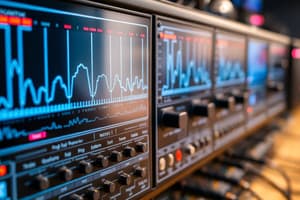Podcast
Questions and Answers
What type of processing deals with linear operations such as amplification and filtering?
What type of processing deals with linear operations such as amplification and filtering?
- Time-Domain Processing
- Linear Processing (correct)
- Frequency-Domain Processing
- Non-linear Processing
Which of the following is a disadvantage of analog processing?
Which of the following is a disadvantage of analog processing?
- High fidelity audio reproduction
- Ease of execution for simple tasks
- Prone to noise and signal erosion (correct)
- True representation of real-world signals
Which signal processing technique transforms signals in the frequency domain?
Which signal processing technique transforms signals in the frequency domain?
- Digital Filtering
- Fourier Transform (correct)
- Pulse Code Modulation
- Amplitude Modulation
Which application is most likely to use analog processing?
Which application is most likely to use analog processing?
What is a primary characteristic of digital processing?
What is a primary characteristic of digital processing?
Which of the following is an example of non-linear processing?
Which of the following is an example of non-linear processing?
Which advantage is often associated with analog processing?
Which advantage is often associated with analog processing?
Which type of processing involves the application of digital filters to enhance signals?
Which type of processing involves the application of digital filters to enhance signals?
What is a primary advantage of digital processing?
What is a primary advantage of digital processing?
Which of the following is NOT a disadvantage of digital processing?
Which of the following is NOT a disadvantage of digital processing?
In which application is digital processing commonly used?
In which application is digital processing commonly used?
How does digital processing compare to analog processing in terms of capturing signals?
How does digital processing compare to analog processing in terms of capturing signals?
What is a significant challenge when implementing digital processing?
What is a significant challenge when implementing digital processing?
Which of the following best describes digital compression?
Which of the following best describes digital compression?
Digital processing provides which of the following benefits?
Digital processing provides which of the following benefits?
What is one major reason digital processing is considered more accurate than analog processing?
What is one major reason digital processing is considered more accurate than analog processing?
Flashcards are hidden until you start studying
Study Notes
Analog Processing
- Involves manipulating smoothly varying continuous-time signals, measured through voltage or current.
- Commonly applied in audio, video, and communication systems, processing real-life signals.
Types of Analog Processing
- Linear Processing: Involves operations like amplification and filtering.
- Non-linear Processing: Includes modulation and demodulation operations.
- Time-Domain Processing: Directly processes signals in relation to time.
- Frequency-Domain Processing: Utilizes techniques such as Fourier Transform to analyze signals in the frequency domain.
- Analog Modulation: Changes a carrier signal to transmit data; examples include AM and FM.
Advantages of Analog Processing
- Represents real-world signals in their true format.
- Easier to implement for basic tasks.
- Lower initial costs for simple applications.
- Offers the highest audio fidelity for sound reproduction.
- Performs well in harsh conditions.
Disadvantages of Analog Processing
- Susceptible to noise interference and signal degradation.
- Less flexible; challenging to modify signals.
- Faces storage limitations requiring large physical media.
- Limited precision in signal representation.
- Poor scalability for complex applications.
Applications of Analog Processing
- Audio Equipment: Includes amplifiers, microphones, and speakers.
- Radio Broadcasting: Facilitates AM and FM transmission.
- Television Transmission: Analog signals for TV broadcasts.
- Medical Devices: Used in ECG and EEG machines.
- Instrumentation: Involves analog sensors and transducers.
Digital Processing
- Centers on manipulating discrete signals represented by binary digits (0s and 1s).
- Samples or quantized versions of analog signals suitable for digital computation and storage.
Types of Digital Processing
- Digital Filtering: Enhances signals by removing noise with digital filters.
- Digital Modulation: Transforms digital data into carrier waves (e.g., QAM, PSK).
- Digital Image Processing: Enhances and extracts information from digital images.
- DSP (Digital Signal Processing): Processes digital signals for audio or communication.
- Digital Compression: Reduces data size for storage or transmission.
Advantages of Digital Processing
- High precision provides accurate signal representation.
- Highly flexible; easily modified or updated.
- Ensures reliable data transmission over long distances, maintaining integrity.
- Compact storage solutions available for efficient data management.
- Easily scalable for large or complex applications.
Disadvantages of Digital Processing
- Higher initial setup costs compared to analog systems.
- Complex implementation requiring advanced hardware and software.
- Possible processing delays in real-time applications.
- Typically consumes more power.
- Vulnerable to cyber threats, including hacking and data breaches.
Applications of Digital Processing
- Computing: Utilized in signal processors within computers and smartphones.
- Telecommunications: Supports digital telephony and internet communications.
- Multimedia: Employed in digital video and audio editing.
- Medical Imaging: Involves MRI, CT scans, and digital x-rays.
- Data Storage: Includes hard drives, SSDs, and cloud storage solutions.
Comparison between Analog and Digital Processing
- Analog processing excels in simplicity and high fidelity for capturing real-world signals, particularly in audio.
- Digital processing is favored for its accuracy, flexibility, and scalability, making it essential in computing, telecommunications, and digital media.
- Understanding both processing methods aids in selecting the most effective approach for specific applications, maximizing efficiency and productivity.
Studying That Suits You
Use AI to generate personalized quizzes and flashcards to suit your learning preferences.




